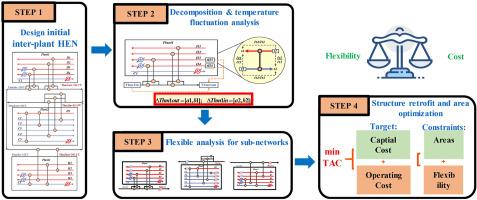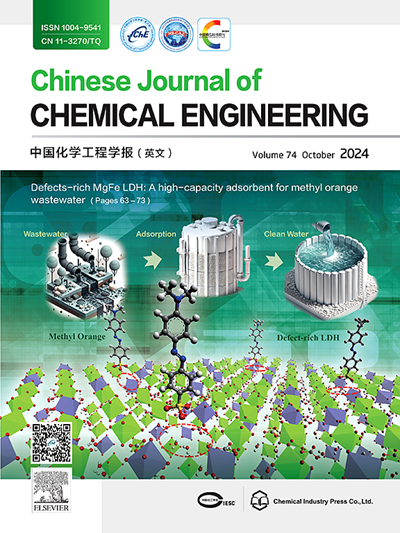Synthesis of flexible inter-plant heat exchanger networks: A decomposition method considering intermedium fluid circles
IF 3.7
3区 工程技术
Q2 ENGINEERING, CHEMICAL
引用次数: 0
Abstract
The traditional methods for synthesizing flexible heat exchanger networks (HENs) are not directly applicable to inter-plant HEN challenges, primarily due to the spread of system uncertainty across plants via intermedium fluid circles. This complicates the synthesis process significantly. To tackle this issue, this study proposes a decomposed stepwise methodology to facilitate the flexible synthesis of the inter-plant HENs performing indirect heat integration. A decomposition strategy is proposed to divide the overall network into manageable sub-networks by dissecting the intermedium fluid circles. To address the variability in intermedium fluid temperatures, a temperature fluctuation analysis approach is developed and a heuristic rule is introduced to maintain the temperature feasibility of the intermedium fluids. To ensure adequate flexibility and cost-effectiveness of the designed networks, flexibility analysis and network retrofit steps are conducted through model-based optimization techniques. The efficacy of the method is demonstrated through two case studies, showing its potential in achieving the desired operational flexibility for inter-plant HENs.

合成灵活的厂际换热网络:考虑中间流体圈的分解方法
合成柔性换热网络(HEN)的传统方法并不能直接适用于工厂间换热网络的挑战,这主要是由于系统的不确定性会通过中间流体循环在工厂间传播。这大大增加了合成过程的复杂性。为解决这一问题,本研究提出了一种分解分步法,以方便灵活地合成进行间接热集成的工厂间 HEN。本研究提出了一种分解策略,通过分解中间流体圈将整个网络划分为易于管理的子网络。为解决中间流体温度的可变性,开发了一种温度波动分析方法,并引入了一种启发式规则,以保持中间流体温度的可行性。为确保设计网络具有足够的灵活性和成本效益,通过基于模型的优化技术进行了灵活性分析和网络改造步骤。通过两个案例研究证明了该方法的有效性,显示了其在实现厂间 HEN 理想运行灵活性方面的潜力。
本文章由计算机程序翻译,如有差异,请以英文原文为准。
求助全文
约1分钟内获得全文
求助全文
来源期刊

Chinese Journal of Chemical Engineering
工程技术-工程:化工
CiteScore
6.60
自引率
5.30%
发文量
4309
审稿时长
31 days
期刊介绍:
The Chinese Journal of Chemical Engineering (Monthly, started in 1982) is the official journal of the Chemical Industry and Engineering Society of China and published by the Chemical Industry Press Co. Ltd. The aim of the journal is to develop the international exchange of scientific and technical information in the field of chemical engineering. It publishes original research papers that cover the major advancements and achievements in chemical engineering in China as well as some articles from overseas contributors.
The topics of journal include chemical engineering, chemical technology, biochemical engineering, energy and environmental engineering and other relevant fields. Papers are published on the basis of their relevance to theoretical research, practical application or potential uses in the industry as Research Papers, Communications, Reviews and Perspectives. Prominent domestic and overseas chemical experts and scholars have been invited to form an International Advisory Board and the Editorial Committee. It enjoys recognition among Chinese academia and industry as a reliable source of information of what is going on in chemical engineering research, both domestic and abroad.
 求助内容:
求助内容: 应助结果提醒方式:
应助结果提醒方式:


